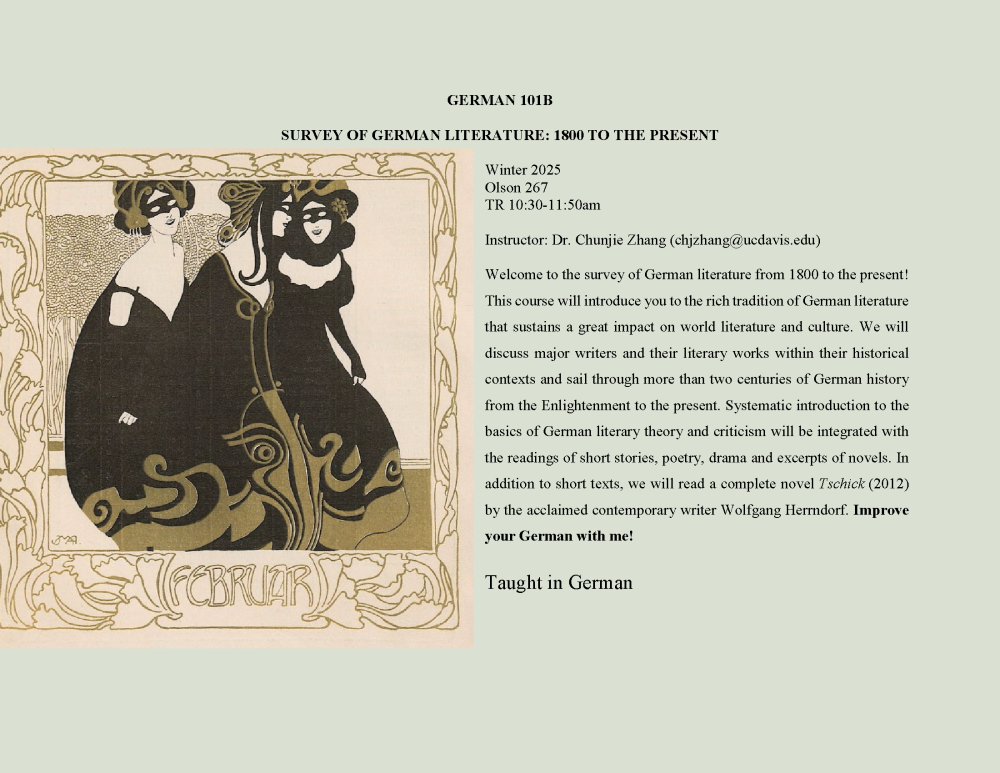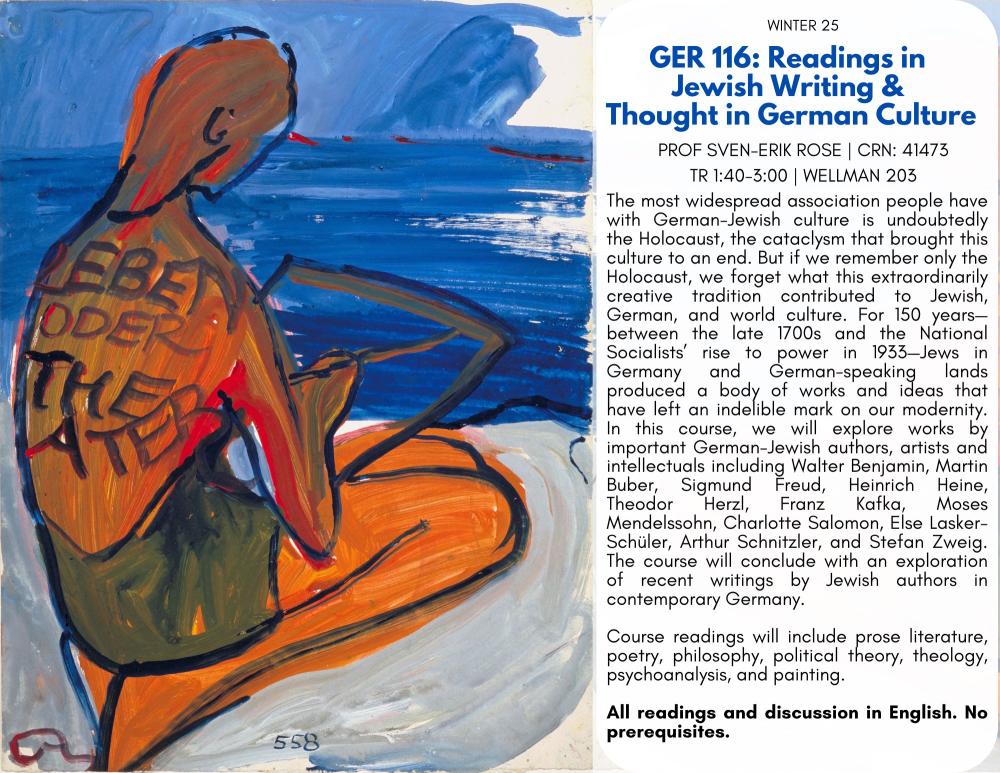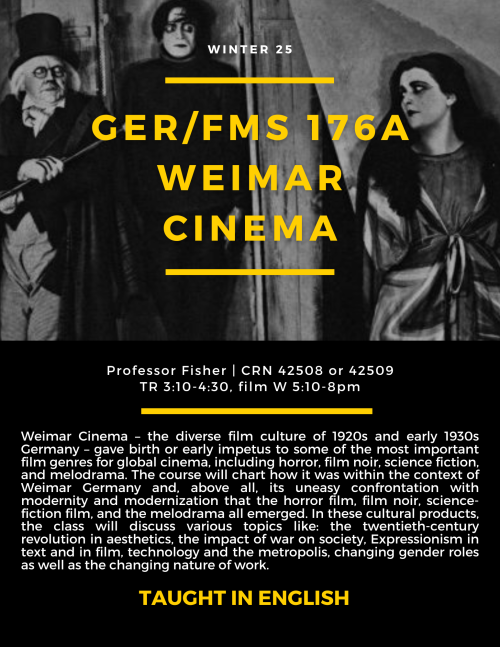Winter Quarter 2025
- For day, time, room, and TA information, see our PDF SCHEDULE or the class search tool https://registrar-apps.ucdavis.edu/courses/search/index.cfm.
- For all courses not described here, please refer to the General Catalog course descriptions: https://catalog.ucdavis.edu/courses-subject-code/ger
Jump to --> Language Courses | Lower-div | Upper-div | Graduate Courses
Not sure where to start with German?
Beginners: GER 001.
If you already know some German, you may be able to start with an intermediate class (020, 021, 022). Students with an AP exam in German and heritage speakers may be able to jump straight into upper division courses (100 numbers) and start working towards a minor or major. Take a placement exam and follow its suggestion unless it places you into 022 (the highest class the test knows): In this case, contact Language Program Coordinator Dr. Kirsten Harjes (kharjes@ucdavis.edu), because you might be ready for the upper division.
Placement exams: Olson Hall 53 (Davis Language Center), walk-ins during business hours, results available immediately. The test takes 20 minutes on the computer.
Lower division language program
GER 001, 002, 003: Elementary German. Introduction into German grammar and vocabulary in cultural contexts around the German speaking world. Classes are taught in German in student-centered small groups, emphasizing speaking, listening, and understanding grammatical concepts.
GER 020, 021, 022: Intermediate German. Classes ensure a review and further practice of first-year grammar with an increasing focus on expanding vocabulary, reading comprehension, and writing. Introduction of longer fictional and non-fictional texts and practice of higher-level communicative strategies and presentational skills.
Undergraduate Courses
Language
GER 002 Elementary German
GER 21 Intermediate German
GER 11 Travel & Modern World
Chunjie Zhang
GER 045 Vampires & Other Horrors
Jaimey Fisher
Upper Division
GER 101B Survey of German Literature, 1800-Present
Chunjie Zhang
Welcome to the survey of German literature from 1800 to the present! This course will introduce you to the rich tradition of German literature that sustains a great impact on world literature and culture. We will discuss major writers and their literary works within their historical contexts and sail through more than two centuries of German history from the Enlightenment to the present. Systematic introduction to the basics of German literary theory and criticism will be integrated with the readings of short stories, poetry, drama and novel excerpts. In addition to short texts, we will read one complete novel: Tshick (2012) by the acclaimed contemporary German writer Wolfgang Herrndorf. Hopefully, this reading experience will provide you the skills to read longer text and encourage you to explore German literature and history on your own. We will also explore the complex literary language in German in various historical

GER 105 Modern German Language
Carlee Arnett
Do you wonder why language is the way it is? Did you sit in your language classes and ask why, only to be told there is no ‘why’ in grammar, it just is that way? Do you wonder why people have such vehement attitudes about their language use? This course will answer those questions for you within the context of the German language. We will also discuss the sounds of German and, most importantly, the people who make those sounds.
Required texts: Readings will be provided by instructor

GER 116 Readings in Jewish Writing & Thought in German Culture
Sven-Erik Rose
The most widespread association people have with German-Jewish culture is undoubtedly the Holocaust, the cataclysm that brought this culture to an end. But if we remember only the Holocaust, we forget what this extraordinarily creative tradition contributed to Jewish, German, and world culture. For 150 years—between the late 1700s and the rise of the National Socialists to power in 1933—Jews in Germany and German-speaking lands produced a body of works and ideas that have left an indelible mark on our modernity. In this course, we will explore works by important German-Jewish authors, artists and intellectuals including Walter Benjamin, Martin Buber, Sigmund Freud, Heinrich Heine, Theodor Herzl, Franz Kafka, Moses Mendelssohn, Charlotte Salomon, Else Lasker-Schüler, Arthur Schnitzler, and Stefan Zweig. The course will conclude with an exploration of recent writings by Jewish authors in contemporary Germany.
Course readings will include prose literature, poetry, philosophy, political theory, theology, psychoanalysis, and painting. All readings and discussion in English. No prerequisites.

GER 176A - Weimar Cinema
Jaimey Fisher
Weimar Cinema – the diverse film culture of 1920s and early 1930s Germany – gave birth or early impetus to some of the most important film genres for global cinema, including horror, film noir, science fiction, and melodrama. The course will chart how it was within the context of Weimar Germany and, above all, its uneasy confrontation with modernity and modernization that the horror film, film noir, science-fiction film, and the melodrama all emerged. In these cultural products, the class will discuss various topics like: the twentieth-century revolution in aesthetics, the impact of war on society, Expressionism in text and in film, technology and the metropolis, changing gender roles as well as the changing nature of work. Focusing on these questions of modernity and cinema as well as the origins of these film genres, the course will reevaluate the canonical films of this period, including The Cabinet of Dr. Caligari, Nosferatu, Metropolis,and M as well as address lesser known works like The Testament of Dr. Mabuse, The Last Laugh, and Girls in Uniform. This course will analyze these films but also the varied and variegated scholarly approaches to Weimar Cinema. A study of Weimar cinema, in fact, affords an indispensable occasion on which to engaged with what is probably the most famous single book of film criticism, Siegfried Kracauer’s From Caligari to Hitler. But the course will not only address Kracauer’s canonical work, but also set Kracauer in a mutually illuminating dialogue with Lotte Eisner and Thomas Elsaesser – and thereby offer diverse approaches to film, an approach that will highlight the range of approaches and stakes in film studies. Taught in English.

Graduate Courses
GER 297 Special Topics in German Literature - German Stories and Literary Theory
Elisabeth Krimmer
This course combines discussions of famous German stories with an introduction to important literary theories of our time. Each class focuses on one theoretical approach, which will serve as a practical tool to enhance our understanding of these canonical stories.
Texts to be discussed include Heinrich von Kleist, “Betrothal in Santo Domingo”; E.T.A. Hoffmann, “The Sandman”; Friedrich de la Motte Fouque, “Undine”; Adelbert von Chamisso, “The Wonderful History of Peter Schlemihl”; Georg Büchner, “Lenz”; Theodor Storm, “The Rider on the White Horse”; Annette von Droste-Hülshoff, “Jew Beech”; Franz Kafka, “Metamorphosis”; Thomas Mann, “Death in Venice”; Ingeborg Bachmann, “Undine Goes.”
The literary theories include psychoanalytic criticism, postcolonialism, New Historicism, feminist criticism, ecocriticism, reader-response theory, Queer theory, and Marxist criticism.
Knowledge of German is welcome but not required.
GER 297, section 2 - Special Topics in German: Cognitive Literary Studies and German Modernism
Chunjie Zhang
In recent decades, “cognitive literary studies” has emerged and forayed into the intersectional area between literary studies and neuroscience. This seminar probes into this novel research field and aims to introduce students to key questions and interpretive attempts in this area. Readings in the philosophical discussions about neuroscientific findings in the works by Catherine Malabou, Thomas Metzinger, and Antonio Damasio serve as the theoretical foundation of this course. At the same time, participants explore the spiritual dimension in literary modernism as well as the discussion of transcendence in critical theory in the early twentieth century. While historical materialism has been a dominant approach to interpret literary modernism and its sociocultural contexts, cognitive literary studies lead us focus on the prominent yet less-discussed area of spirituality in modernism in conjunction with the transcendental in critical theory, for example in the writings by Georg Lukács, Walter Benjamin, Max Weber, and C. G. Jung. Literary texts we read may include those by Hermann Hesse, Thomas Mann, Bertolt Brecht, Alfred Döblin, and Franz Kafka.
